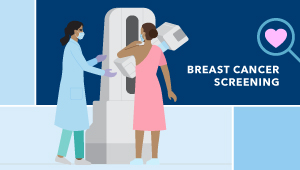Karen J. Wernli, PhD
Biography
Karen Wernli, PhD, is a cancer epidemiologist and health services researcher whose work focuses on incorporating patient-centered outcomes to improve cancer care along the cancer care continuum, from prevention to survivorship. Her works spans several types of cancer, including lung, breast, and colorectal, and also explores the impact of cancer in special populations, such as adolescents and young adults. Her research strives to answer critical questions at the confluence of patients’ needs and clinical priorities. Overall, her research has resulted in approximately $30 million in research funding as principal investigator (PI) or site PI, more than 125 peer-reviewed publications (h-index 35), and more than 85 presentations at national conferences, symposia, and other public venues.
Dr. Wernli is a leader in multilevel intervention studies to improve lung cancer screening. She is currently conducting a pragmatic clinical trial funded by the National Cancer Institute (NCI) to test 2 multilevel interventions to improve adherence to annual lung cancer screening at Kaiser Permanente Washington (R01CA262015). Study interventions were developed using a mixed-methods approach — including patient and stakeholder engagement and human-centered design methods — to determine gaps for interventions, relevant features of interventions, and design concepts. Further, Dr. Wernli is also leading a pilot grant from the Alliance for Clinical Trials in Oncology to develop interventions to improve timely follow-up after a positive lung cancer screening scan. She is cancer care delivery research lead for the Kaiser Permanente Washington NCI Community Oncology Research Program (NCORP).
Dr. Wernli is a leader in the use of breast imaging in women with prior breast cancer, including in the use of breast magnetic resonance imaging (MRI). Dr. Wernli recently completed a Patient-Centered Outcomes Research Institute (PCORI) project that compared breast MRI to mammography for women already treated for breast cancer. Called Surveillance Imaging Modalities for Breast Cancer Assessment (SIMBA), the study used data from the Breast Cancer Surveillance Consortium (BCSC) and engaged patients and stakeholders to determine the best information for patient and physician decision-making. Dr. Wernli’s team translated that information into a new decision aid for breast cancer survivors. PCORI has recognized this work nationally and pointed to SIMBA as a model for effective patient engagement.
Dr. Wernli’s other breast cancer projects include collaborating with Natasha Stout, PhD, from Harvard University on an NCI-funded study to examine trends and outcomes related to the mandatory notification of breast density that has been enacted in many states. She also led research to determine temporal trends in the use of breast MRI over 10 years, based on indication for the scans. The analysis relied on national claims-based data across all 50 states.
Dr. Wernli is leading patient-centered research in adolescent and young adult (AYA) populations. She is a project co-lead with Kaiser Permanente Southern California researcher Erin Hahn, PhD, MPH, and Veterans Affairs researcher Neetu Chawla, PhD, MPH, in an NCI-funded project to evaluate health service utilization in early survivorship for AYA populations. The research is intended to identify multilevel gaps in health care utilization in AYA early-cancer survivors for forthcoming interventions. Previously, Dr. Wernli launched the Clare Project with KPWHRI researchers, including Marlaine Figueroa Gray, PhD, to understand patient, caregiver, and provider perspectives regarding medical decision-making for patients with advanced cancer. Using novel methods, all perspectives were garnered through social media recruitment. With NCI-funding, she has evaluated temporal trends and regional variation in end-of-life care in AYA cancer populations using national claims-based data.
Finally, Dr. Wernli is expanding her research expertise in clinical research studies beyond oncology clinical trials. She is principal investigator of a multisite study of flu and COVID-19 vaccine effectiveness funded by the Centers for Disease Control and Prevention from 2022 to 2027. Her study team is annually enrolling about 1,200 participants with flu-like symptoms into her research.
Dr. Wernli is a member of the American Society for Preventive Oncology, the Society for Epidemiologic Research, the American Society for Clinical Oncology, and the American Association for Cancer Research. She is an affiliate professor of epidemiology and health systems and population health at the University of Washington and a professor of health system science at the Kaiser Permanente Bernard J. Tyson School of Medicine.
Research interests and experience
-
Cancer
Breast, lung, colorectal, ovarian, skin, and endometrial cancer; screening and surveillance; survivorship; patient-centered care; biostatistics; low-dose CT (LDCT); mammography; surveillance imaging; breast magnetic resonance imaging (MRI); systematic reviews; multilevel intervention studies; pragmatic clinical trials
-
Health Services & Economics
Comparative effectiveness research, health outcomes research, patient-centered outcomes, health care quality, implementation science
Preventive Medicine
Cancer screening and surveillance
-
Patient-Centeredness
Patient engagement, stakeholder engagement, qualitative research methods, mixed-methods, human-centered design
-
Vaccines & Infectious Diseases
-
Aging & Geriatrics
Recent publications
Hahn EE, Staab J, Munoz-Plaza C, Gander J, Kushi L, McMullin C, Oshiro C, Wernli KJ, Ritzwoller D. Incidence and survival for breast, colorectal and lung cancer patients in an integrated system. Perm J. 2023 Sep 19;1-7. doi: 10.7812/TPP/23.021. Online ahead of print. PubMed
Ahmed F, Nowalk MP, Zimmerman RK, Bear T, Grijalva CG, Talbot HK, Florea A, Tartof SY, Gaglani M, Smith M, McLean HQ, King JP, Martin ET, Monto AS, Phillips CH, Wernli KJ, Flannery B, Chung JR, Uzicanin A. Work attendance during acute respiratory illness before and during the COVID-19 pandemic, United States, 2018-2022. medRxiv 2023. PubMed
Lee JM, Ichikawa LE, Wernli KJ, Bowles EAJ, Specht JM, Kerlikowske K, Miglioretti DL, Lowry KP, Tosteson ANA, Stout NK, Houssami N, Onega T, Buist DSM. Impact of surveillance mammography intervals less than one year on performance measures in women with a personal history of breast cancer. J Korean Radiol. 2023 Aug;24(8):729-738. doi: 10.3348/kjr.2022.1038. PubMed
Knerr S, Guo B, Wernli KJ, Mittendorf KF, Feigelson HS, Gilmore MJ, Jarvik GP, Kauffman TL, Keast E, Liles EG, Lynch FL, Muessig KR, Okuyama S, Veenstra DL, Zepp JM, Wilfond BS, Devine B, Goddard KAB. Longitudinal adherence to breast cancer surveillance following cancer genetic testing in an integrated health care system. Breast Cancer Res Treat. 2023 Oct;201(3):461-470. doi: 10.1007/s10549-023-07007-w. Epub 2023 Jul 20. PubMed
Tartof SY, Xie F, Yadav R, Wernli KJ, Martin ET, Belongia EA, Gaglani M, Zimmerman RK, Talbot HK, Thornburg N, Flannery B; US Flu VE Network Investigators. Prior SARS-CoV-2 infection and COVID-19 vaccine effectiveness against outpatient illness during widespread circulation of SARS-CoV-2 Omicron variant, US Flu VE network. Influenza Other Respir Viruses. 2023 May;17(5):e13143. doi: 10.1111/irv.13143. PubMed
Nichols H, Wernli KJ, Chawla N, O’Meara ES, Figueroa Gray M, Green LE, Baggett CD, Casperson M, Chao C, Jones SM, Kirchhoff AC, Kuo T, Lee C , Malogolowkin M, Quesenberry CP, Ruddy KJ, Wun T, Zebrack B, Chubak J, Hahn EE, Keegan TH, Kushi LH. Challenges and opportunities of epidemiological studies to reduce the burden of cancers in young adults. Curr Epidemiol Rep. 2023 Sep;10(3):115-124. doi: 10.1007/s40471-022-00286-9. Epub 2022 Mar 29. PubMed
Hood N, Flannery B, Gaglani M, Beeram M, Wernli K, Jackson ML, Martin ET, Monto AS, Zimmerman R, Raviotta J, Belongia EA, McLean HQ, Kim S, Patel M, Chung J. Influenza vaccine effectiveness among children: 2011-2020. Pediatrics. 2023 Mar 24;e2022059922. doi: 10.1542/peds.2022-059922. Online ahead of print. PubMed
Bi Q, Dickerman BA, McLean HQ, Martin ET, Gaglani M, Wernli KJ, Goundappa B, Flannery B, Lipsitch M, Cobey S; US Flu Vaccine Effectiveness Network Investigators. Evaluating reduced effectiveness after repeat influenza vaccination while accounting for confounding by recent infection and within-season waning. medRxiv. 2023 Mar 17:2023.03.12.23287173. doi: 10.1101/2023.03.12.23287173. Preprint. PubMed
Lowry KP, Ichikawa L, Hubbard RA, Buist DSM, Bowles EJA, Henderson LM, Kerlikowske K, Specht JM, Sprague BL, Wernli KJ, Lee JM. Variation in second breast cancer risk after primary invasive cancer by time since primary cancer diagnosis and estrogen receptor status. Cancer. 2023 Feb 15. doi: 10.1002/cncr.34679. [Epub ahead of print]. PubMed
Su YR, Buist DS, Lee JM, Ichikawa L, Miglioretti DL, Aiello Bowles EJ, Wernli KJ, Kerlikowske K, Tosteson A, Lowry KP, Henderson LM, Sprague BL, Hubbard RA. Performance of statistical and machine learning risk prediction models for surveillance benefits and failures in breast cancer survivors. Cancer Epidemiol Biomarkers Prev. 2023 Jan 25:EPI-22-0677. doi: 10.1158/1055-9965.EPI-22-0677. [Epub ahead of print]. PubMed
Healthy Findings Blog

On the ground with KPWHRI’s flu trackers
Researchers Karen Wernli and Erika Kiniry share insights on an exceptional 2024-2025 flu season.
News

2023 KPWHRI mentorship awards go to Claire Allen and Karen Wernli
Kudos emphasized dedication to helping coworkers grow, providing opportunities.
Research

Study sheds light on needs of young people with cancer
Understanding emergency department use among adolescent and young adult cancer survivors can help address care gaps.
Research

KPWHRI contributes to flu vaccine effectiveness results
Interim data for the 2023-2024 flu season shows that the vaccine has protected all age groups.
Research

Improving cancer prevention and early detection
How KPWHRI is contributing to better cancer screening and better outcomes for patients.
News

KPWHRI begins new phase of flu surveillance
KPWHRI receives $10 million to continue vaccine effectiveness research for flu, COVID-19, and other respiratory diseases.
Research

Roundup of 3 recent studies on breast cancer screening
New research spotlights overdiagnosis, MRI before surgery, and a new way of predicting breast cancer risk
KPWHRI in the media
Understanding the needs of young cancer survivors
Emergency department use common among AYA cancer survivors
Cure, May 10, 2024



